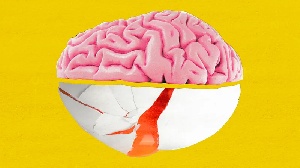Health News of Wednesday, 9 April 2025
Source: www.ghanawebbers.com
Choline: The underappreciated nutrient that's vital for our brains
Choline is linked to better cognitive performance and reduced anxiety. But are you getting enough of it?
You may not know about choline, but it's essential for health. Studies show its importance at various life stages.
Choline is an organic compound, not a vitamin or mineral. It is vital for the nervous system's healthy functioning. Emerging evidence suggests that more choline can improve cognition and protect against disorders like ADHD and dyslexia.
Choline plays a significant role in human neurodevelopment. One study found that babies whose mothers took choline supplements had faster information processing speeds.
Scientists call choline a wonder-nutrient, but it’s often overlooked. So where does it come from, and are you getting enough?
Every cell in our body contains choline, according to Xinyin Jiang, a professor at Brooklyn College. Choline is an "essential" nutrient; we need it for health but can't produce enough ourselves. We must obtain it through our diets.
Choline is similar to omega-3 fatty acids and closely associated with B vitamins, says Emma Derbyshire, a science writer. You can find choline mainly in animal-based foods like beef, eggs, fish, chicken, and milk. It's also present in peanuts, kidney beans, mushrooms, and cruciferous vegetables like broccoli.
We need choline for many bodily functions including liver function. A deficiency can lead to several health issues.
"Choline helps transport fat out of the liver," Jiang explains. "A deficiency can cause fatty liver."
Soybeans provide a rich plant-based source of choline with 120mg per 100g.
Choline helps synthesize phospholipids, which are crucial for cell membranes. A lack of this nutrient can affect gene expression related to cell multiplication.
During fetal development, insufficient choline can inhibit brain cell proliferation.
Choline's role in the brain is critical; it's primarily a "brain nutrient." It's necessary for producing acetylcholine—a neurotransmitter that carries messages from the brain through nerve cells.
In one study with nearly 1,400 participants aged 36 to 83 years old, higher choline intake correlated with better memory performance. Midlife choline intake may help protect our brains as well.
Choline is often included in nootropic supplements aimed at enhancing learning and memory.
Conversely, low levels of choline have been linked to neurodegenerative disorders like Alzheimer's and Parkinson's disease.
Research shows that higher dietary intake of choline correlates with lower anxiety levels. Another study found links between higher choline intake and reduced depression risk.
Adequate choline intake offers additional benefits too. Research on mice indicates that it may lower homocysteine levels—an amino acid linked to heart disease risks.
High homocysteine levels are also associated with osteoporosis. People with higher dietary choline tend to have greater bone density—indicating stronger bones less prone to fractures.
"Choline may help prevent bone loss," says Øyen Jannike from Norway's Institute of Marine Research.
This could be due partly to its effect on homocysteine but also because it's essential for cell membranes' structure.
The first 1,000 days of life are critical for development; maternal diet during pregnancy greatly influences this process.
Studies indicate that adequate prenatal chiline supports fetal development significantly. Babies are born with three times as much chiline as their mothers—highlighting its importance during this stage of life.
Research shows that womb supply of cholin correlates with cognitive outcomes later on in children’s lives.
Pregnant women who consumed high amounts of dietary cholin during their second trimester had children who scored better on memory tests at age seven.
Some studies suggest low maternal cholin intake might link to ADHD behaviors in children.
Are we getting enough cholin?
In Europe, the European Food Safety Authority recommends adults consume 400mg daily while pregnant or breastfeeding individuals should aim for 480mg or 520mg respectively.
In the US, recommendations set by the Institute of Medicine suggest men should get 550mg daily while women should aim for 425mg—or 450mg during pregnancy and 550mg while breastfeeding.
An egg contains around 150mg of cholin; chicken breast has about 72mg; peanuts offer around 24mg.
In 2017 the American Medical Association advised prenatal vitamins include evidence-based amounts of cholin.
"We're seeing more ADHD and dyslexia cases," Derbyshire notes. "Some genetic factors exist but inadequate nutrients during pregnancy could play a role."
Jiang studied how maternal cholin affects brain development: “More maternal cholin leads to better cognitive outcomes,” she states.
A review from 2020 analyzed multiple studies showing that cholin supplementation aids brain development.
However only animal studies currently show strong links between cholin and improved cognition.
Most human studies use supplements providing up to 930mg of cholin daily without adverse effects reported.
Certain individuals may require more than recommended amounts—like post-menopausal women or those with fatty liver disease according to Øyen.
Genetic differences mean some people might need more cholin than others too.
Peanuts contain high levels—61-66 mg per 100g of peanut butter!
When we eat foods containing cholin it's easily absorbed into our bloodstream according to Jiang—which helps ensure adequate consumption levels.
However many studies indicate many people aren't meeting their needs: one found only 11% of American adults consume recommended amounts!
Eggs are potent sources; vegans might struggle without them—but there are plant-based options available along with supplements widely accessible today!
One study concluded those eating eggs had almost double usual intakes compared those who don’t eat them leading researchers conclude achieving adequate daily amounts without eggs or supplements was “extremely difficult.”
But EFSA’s recommendation (400 mg/day) remains achievable if you plan your diet carefully says Jiang! Vegan sources include tofu (28 mg/100g), peanut butter (61-66 mg/100g), soybeans (120 mg/100g).
Anyone worried about insufficient intake can consider taking daily supplements according Øyen! More research needed though—to fully understand mechanisms behind some benefits associated w/cholin!
“Clinicians becoming aware” says Derbyshire! While often overlooked she hopes soon “cholin will enjoy limelight.”











